TRAINING ASSIGMENT.
VerifiedAdded on 2023/01/05
|9
|3117
|68
AI Summary
My assignment is a request to develop a training course (without delivering it).
Course chosen is: Teamwork & Collaboration Skills
The course is to be written as pages (word) or slides (ppt) - I prefer ppt
Most of the content should not have very long paragraphs.
The content is to be written in the way of delivering or reading, the way of talking to the students or public, no much academic method.
In the introduction (first page or first few slides) to include the learning objectives, course description
You need to write as the following,
The course to be 4 modules / Units (3 in teamwork and 1 in collaboration)
To write minimum 6 learning objectives for the whole course
To write sub objectives, each learning objective to have 2 to 3 breakdown objectives
Example of the above - modules 1 -(Units 1 - Lesson 1, Lesson 2 Lesson 3 ..Units 2 - Lesson 1 Lesson 2..)
All objectives are to start with the action verbs attached (bloom's taxonomy Level 4), and the level of writing the content is
Contribute Materials
Your contribution can guide someone’s learning journey. Share your
documents today.
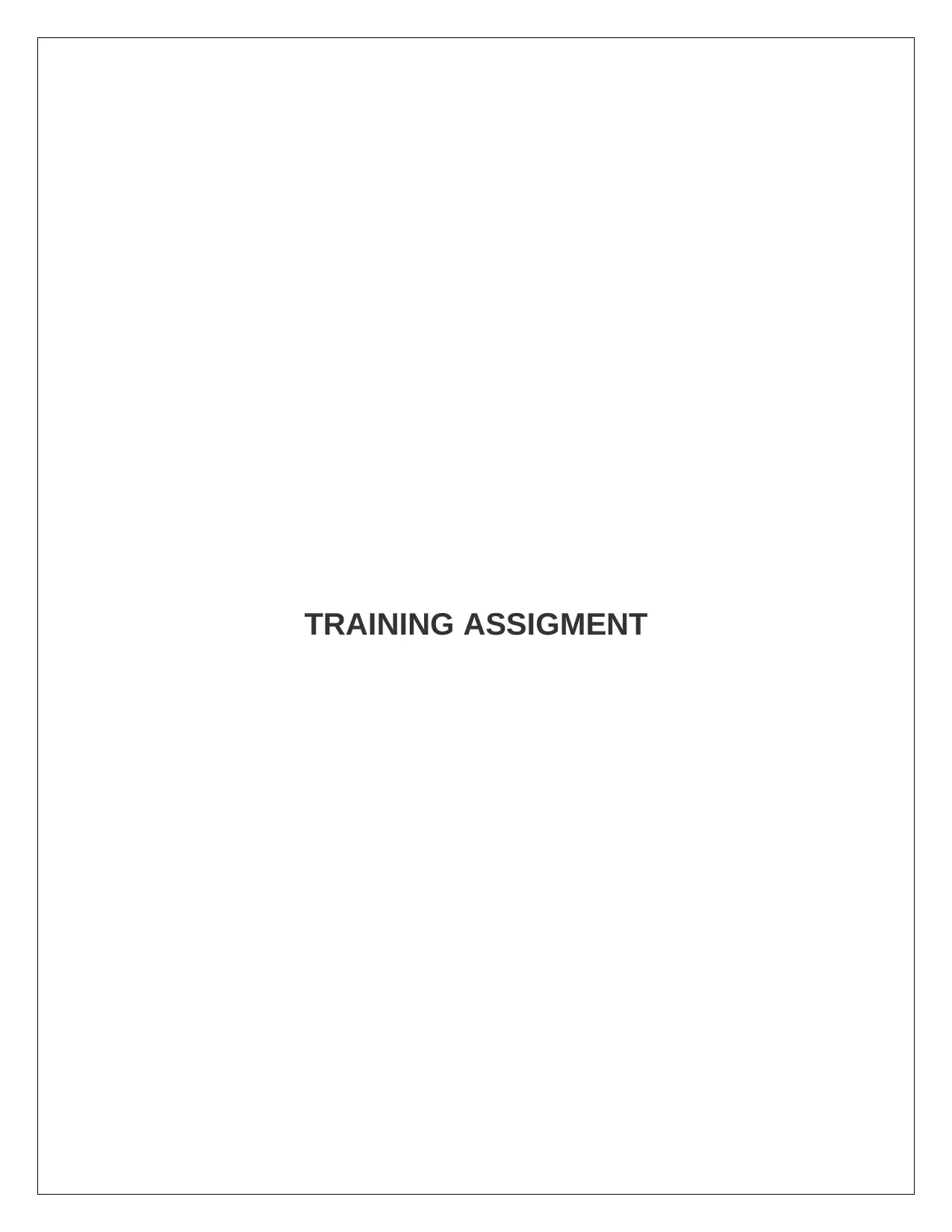
TRAINING ASSIGMENT
Secure Best Marks with AI Grader
Need help grading? Try our AI Grader for instant feedback on your assignments.
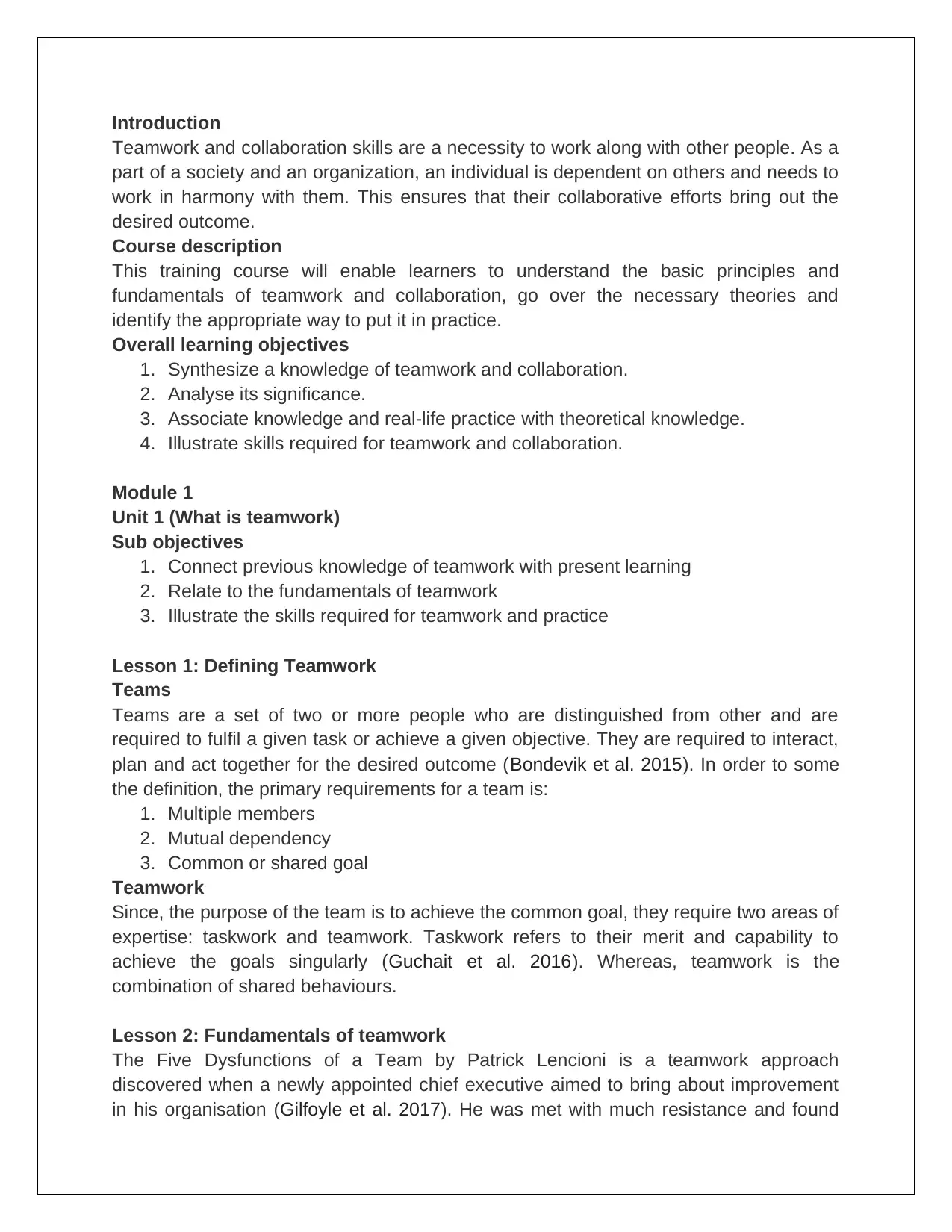
Introduction
Teamwork and collaboration skills are a necessity to work along with other people. As a
part of a society and an organization, an individual is dependent on others and needs to
work in harmony with them. This ensures that their collaborative efforts bring out the
desired outcome.
Course description
This training course will enable learners to understand the basic principles and
fundamentals of teamwork and collaboration, go over the necessary theories and
identify the appropriate way to put it in practice.
Overall learning objectives
1. Synthesize a knowledge of teamwork and collaboration.
2. Analyse its significance.
3. Associate knowledge and real-life practice with theoretical knowledge.
4. Illustrate skills required for teamwork and collaboration.
Module 1
Unit 1 (What is teamwork)
Sub objectives
1. Connect previous knowledge of teamwork with present learning
2. Relate to the fundamentals of teamwork
3. Illustrate the skills required for teamwork and practice
Lesson 1: Defining Teamwork
Teams
Teams are a set of two or more people who are distinguished from other and are
required to fulfil a given task or achieve a given objective. They are required to interact,
plan and act together for the desired outcome (Bondevik et al. 2015). In order to some
the definition, the primary requirements for a team is:
1. Multiple members
2. Mutual dependency
3. Common or shared goal
Teamwork
Since, the purpose of the team is to achieve the common goal, they require two areas of
expertise: taskwork and teamwork. Taskwork refers to their merit and capability to
achieve the goals singularly (Guchait et al. 2016). Whereas, teamwork is the
combination of shared behaviours.
Lesson 2: Fundamentals of teamwork
The Five Dysfunctions of a Team by Patrick Lencioni is a teamwork approach
discovered when a newly appointed chief executive aimed to bring about improvement
in his organisation (Gilfoyle et al. 2017). He was met with much resistance and found
Teamwork and collaboration skills are a necessity to work along with other people. As a
part of a society and an organization, an individual is dependent on others and needs to
work in harmony with them. This ensures that their collaborative efforts bring out the
desired outcome.
Course description
This training course will enable learners to understand the basic principles and
fundamentals of teamwork and collaboration, go over the necessary theories and
identify the appropriate way to put it in practice.
Overall learning objectives
1. Synthesize a knowledge of teamwork and collaboration.
2. Analyse its significance.
3. Associate knowledge and real-life practice with theoretical knowledge.
4. Illustrate skills required for teamwork and collaboration.
Module 1
Unit 1 (What is teamwork)
Sub objectives
1. Connect previous knowledge of teamwork with present learning
2. Relate to the fundamentals of teamwork
3. Illustrate the skills required for teamwork and practice
Lesson 1: Defining Teamwork
Teams
Teams are a set of two or more people who are distinguished from other and are
required to fulfil a given task or achieve a given objective. They are required to interact,
plan and act together for the desired outcome (Bondevik et al. 2015). In order to some
the definition, the primary requirements for a team is:
1. Multiple members
2. Mutual dependency
3. Common or shared goal
Teamwork
Since, the purpose of the team is to achieve the common goal, they require two areas of
expertise: taskwork and teamwork. Taskwork refers to their merit and capability to
achieve the goals singularly (Guchait et al. 2016). Whereas, teamwork is the
combination of shared behaviours.
Lesson 2: Fundamentals of teamwork
The Five Dysfunctions of a Team by Patrick Lencioni is a teamwork approach
discovered when a newly appointed chief executive aimed to bring about improvement
in his organisation (Gilfoyle et al. 2017). He was met with much resistance and found
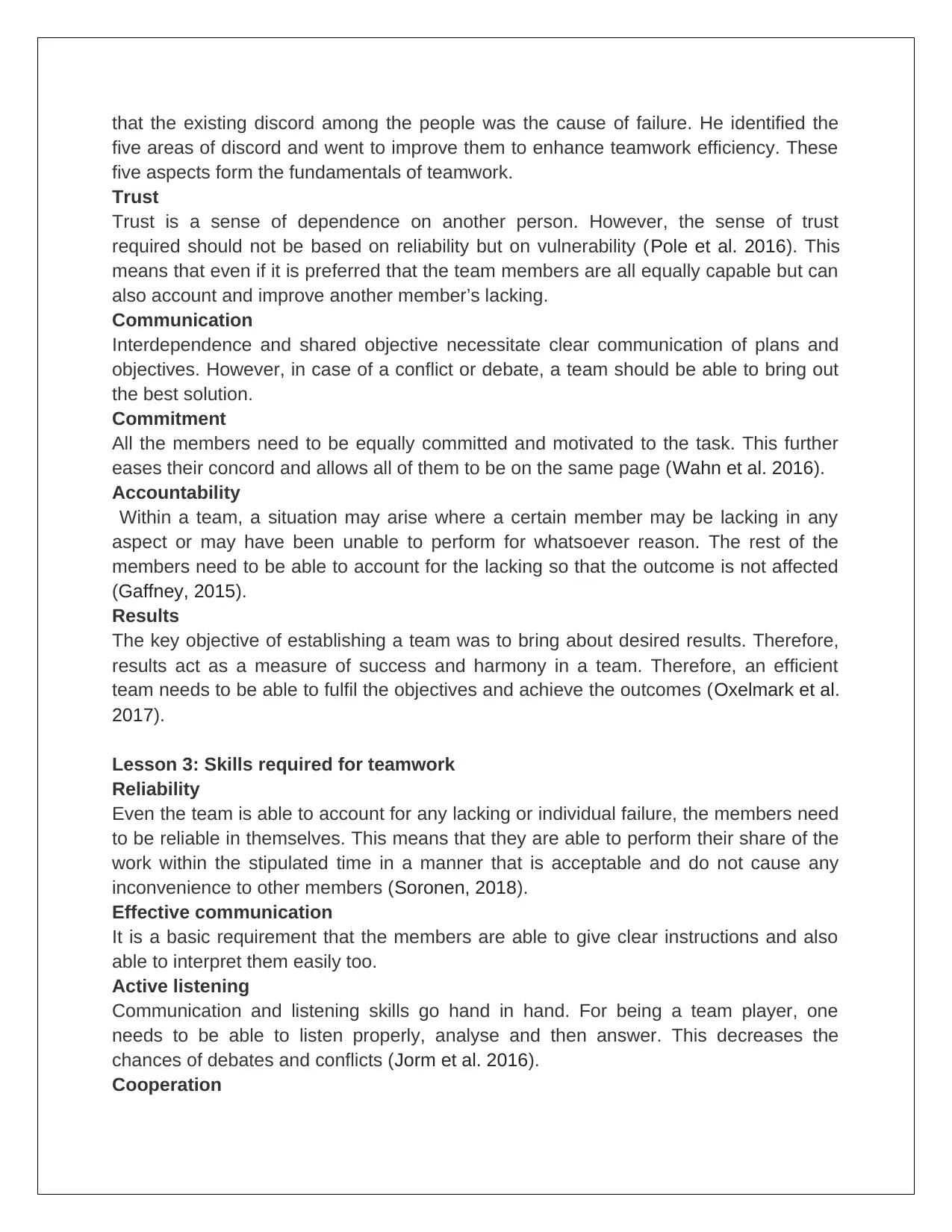
that the existing discord among the people was the cause of failure. He identified the
five areas of discord and went to improve them to enhance teamwork efficiency. These
five aspects form the fundamentals of teamwork.
Trust
Trust is a sense of dependence on another person. However, the sense of trust
required should not be based on reliability but on vulnerability (Pole et al. 2016). This
means that even if it is preferred that the team members are all equally capable but can
also account and improve another member’s lacking.
Communication
Interdependence and shared objective necessitate clear communication of plans and
objectives. However, in case of a conflict or debate, a team should be able to bring out
the best solution.
Commitment
All the members need to be equally committed and motivated to the task. This further
eases their concord and allows all of them to be on the same page (Wahn et al. 2016).
Accountability
Within a team, a situation may arise where a certain member may be lacking in any
aspect or may have been unable to perform for whatsoever reason. The rest of the
members need to be able to account for the lacking so that the outcome is not affected
(Gaffney, 2015).
Results
The key objective of establishing a team was to bring about desired results. Therefore,
results act as a measure of success and harmony in a team. Therefore, an efficient
team needs to be able to fulfil the objectives and achieve the outcomes (Oxelmark et al.
2017).
Lesson 3: Skills required for teamwork
Reliability
Even the team is able to account for any lacking or individual failure, the members need
to be reliable in themselves. This means that they are able to perform their share of the
work within the stipulated time in a manner that is acceptable and do not cause any
inconvenience to other members (Soronen, 2018).
Effective communication
It is a basic requirement that the members are able to give clear instructions and also
able to interpret them easily too.
Active listening
Communication and listening skills go hand in hand. For being a team player, one
needs to be able to listen properly, analyse and then answer. This decreases the
chances of debates and conflicts (Jorm et al. 2016).
Cooperation
five areas of discord and went to improve them to enhance teamwork efficiency. These
five aspects form the fundamentals of teamwork.
Trust
Trust is a sense of dependence on another person. However, the sense of trust
required should not be based on reliability but on vulnerability (Pole et al. 2016). This
means that even if it is preferred that the team members are all equally capable but can
also account and improve another member’s lacking.
Communication
Interdependence and shared objective necessitate clear communication of plans and
objectives. However, in case of a conflict or debate, a team should be able to bring out
the best solution.
Commitment
All the members need to be equally committed and motivated to the task. This further
eases their concord and allows all of them to be on the same page (Wahn et al. 2016).
Accountability
Within a team, a situation may arise where a certain member may be lacking in any
aspect or may have been unable to perform for whatsoever reason. The rest of the
members need to be able to account for the lacking so that the outcome is not affected
(Gaffney, 2015).
Results
The key objective of establishing a team was to bring about desired results. Therefore,
results act as a measure of success and harmony in a team. Therefore, an efficient
team needs to be able to fulfil the objectives and achieve the outcomes (Oxelmark et al.
2017).
Lesson 3: Skills required for teamwork
Reliability
Even the team is able to account for any lacking or individual failure, the members need
to be reliable in themselves. This means that they are able to perform their share of the
work within the stipulated time in a manner that is acceptable and do not cause any
inconvenience to other members (Soronen, 2018).
Effective communication
It is a basic requirement that the members are able to give clear instructions and also
able to interpret them easily too.
Active listening
Communication and listening skills go hand in hand. For being a team player, one
needs to be able to listen properly, analyse and then answer. This decreases the
chances of debates and conflicts (Jorm et al. 2016).
Cooperation
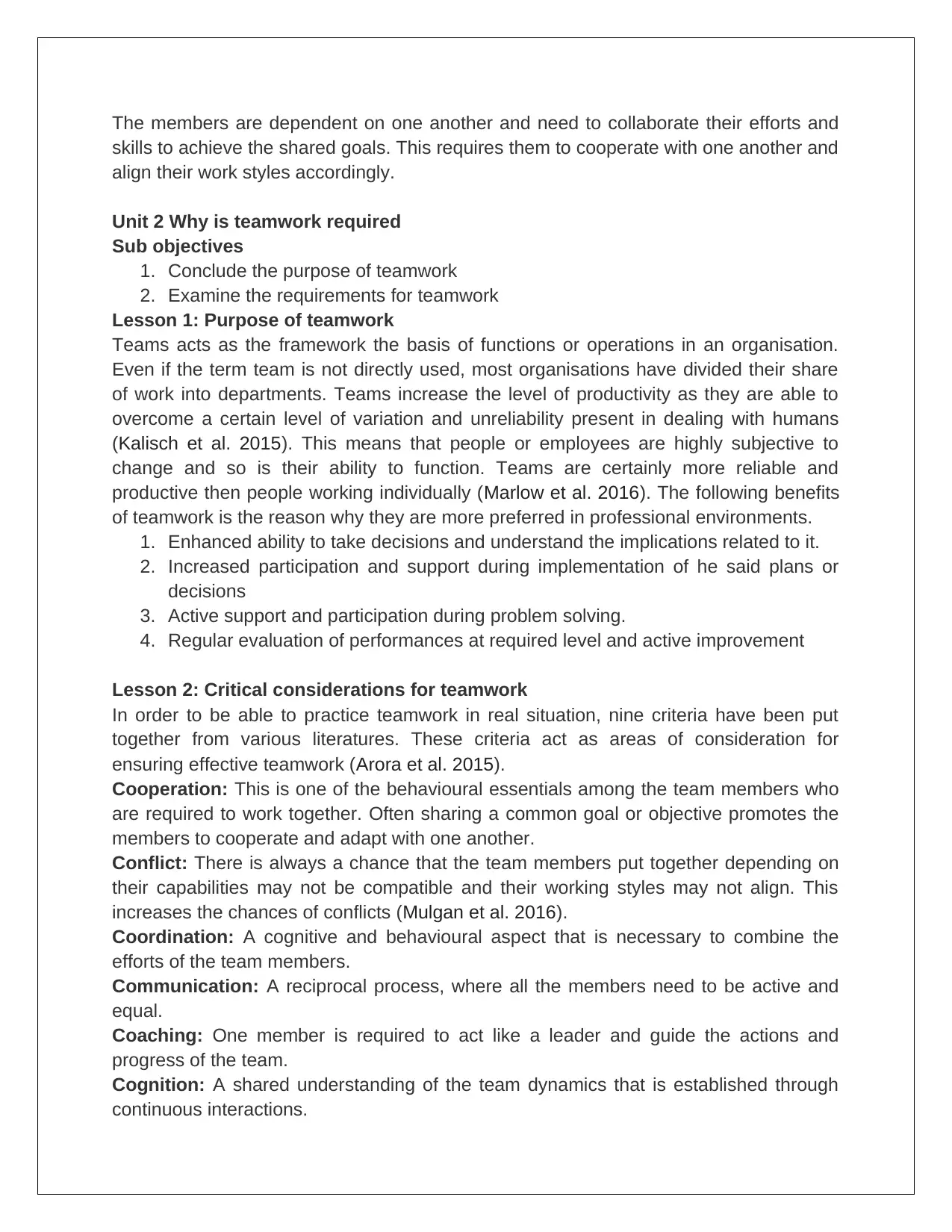
The members are dependent on one another and need to collaborate their efforts and
skills to achieve the shared goals. This requires them to cooperate with one another and
align their work styles accordingly.
Unit 2 Why is teamwork required
Sub objectives
1. Conclude the purpose of teamwork
2. Examine the requirements for teamwork
Lesson 1: Purpose of teamwork
Teams acts as the framework the basis of functions or operations in an organisation.
Even if the term team is not directly used, most organisations have divided their share
of work into departments. Teams increase the level of productivity as they are able to
overcome a certain level of variation and unreliability present in dealing with humans
(Kalisch et al. 2015). This means that people or employees are highly subjective to
change and so is their ability to function. Teams are certainly more reliable and
productive then people working individually (Marlow et al. 2016). The following benefits
of teamwork is the reason why they are more preferred in professional environments.
1. Enhanced ability to take decisions and understand the implications related to it.
2. Increased participation and support during implementation of he said plans or
decisions
3. Active support and participation during problem solving.
4. Regular evaluation of performances at required level and active improvement
Lesson 2: Critical considerations for teamwork
In order to be able to practice teamwork in real situation, nine criteria have been put
together from various literatures. These criteria act as areas of consideration for
ensuring effective teamwork (Arora et al. 2015).
Cooperation: This is one of the behavioural essentials among the team members who
are required to work together. Often sharing a common goal or objective promotes the
members to cooperate and adapt with one another.
Conflict: There is always a chance that the team members put together depending on
their capabilities may not be compatible and their working styles may not align. This
increases the chances of conflicts (Mulgan et al. 2016).
Coordination: A cognitive and behavioural aspect that is necessary to combine the
efforts of the team members.
Communication: A reciprocal process, where all the members need to be active and
equal.
Coaching: One member is required to act like a leader and guide the actions and
progress of the team.
Cognition: A shared understanding of the team dynamics that is established through
continuous interactions.
skills to achieve the shared goals. This requires them to cooperate with one another and
align their work styles accordingly.
Unit 2 Why is teamwork required
Sub objectives
1. Conclude the purpose of teamwork
2. Examine the requirements for teamwork
Lesson 1: Purpose of teamwork
Teams acts as the framework the basis of functions or operations in an organisation.
Even if the term team is not directly used, most organisations have divided their share
of work into departments. Teams increase the level of productivity as they are able to
overcome a certain level of variation and unreliability present in dealing with humans
(Kalisch et al. 2015). This means that people or employees are highly subjective to
change and so is their ability to function. Teams are certainly more reliable and
productive then people working individually (Marlow et al. 2016). The following benefits
of teamwork is the reason why they are more preferred in professional environments.
1. Enhanced ability to take decisions and understand the implications related to it.
2. Increased participation and support during implementation of he said plans or
decisions
3. Active support and participation during problem solving.
4. Regular evaluation of performances at required level and active improvement
Lesson 2: Critical considerations for teamwork
In order to be able to practice teamwork in real situation, nine criteria have been put
together from various literatures. These criteria act as areas of consideration for
ensuring effective teamwork (Arora et al. 2015).
Cooperation: This is one of the behavioural essentials among the team members who
are required to work together. Often sharing a common goal or objective promotes the
members to cooperate and adapt with one another.
Conflict: There is always a chance that the team members put together depending on
their capabilities may not be compatible and their working styles may not align. This
increases the chances of conflicts (Mulgan et al. 2016).
Coordination: A cognitive and behavioural aspect that is necessary to combine the
efforts of the team members.
Communication: A reciprocal process, where all the members need to be active and
equal.
Coaching: One member is required to act like a leader and guide the actions and
progress of the team.
Cognition: A shared understanding of the team dynamics that is established through
continuous interactions.
Secure Best Marks with AI Grader
Need help grading? Try our AI Grader for instant feedback on your assignments.
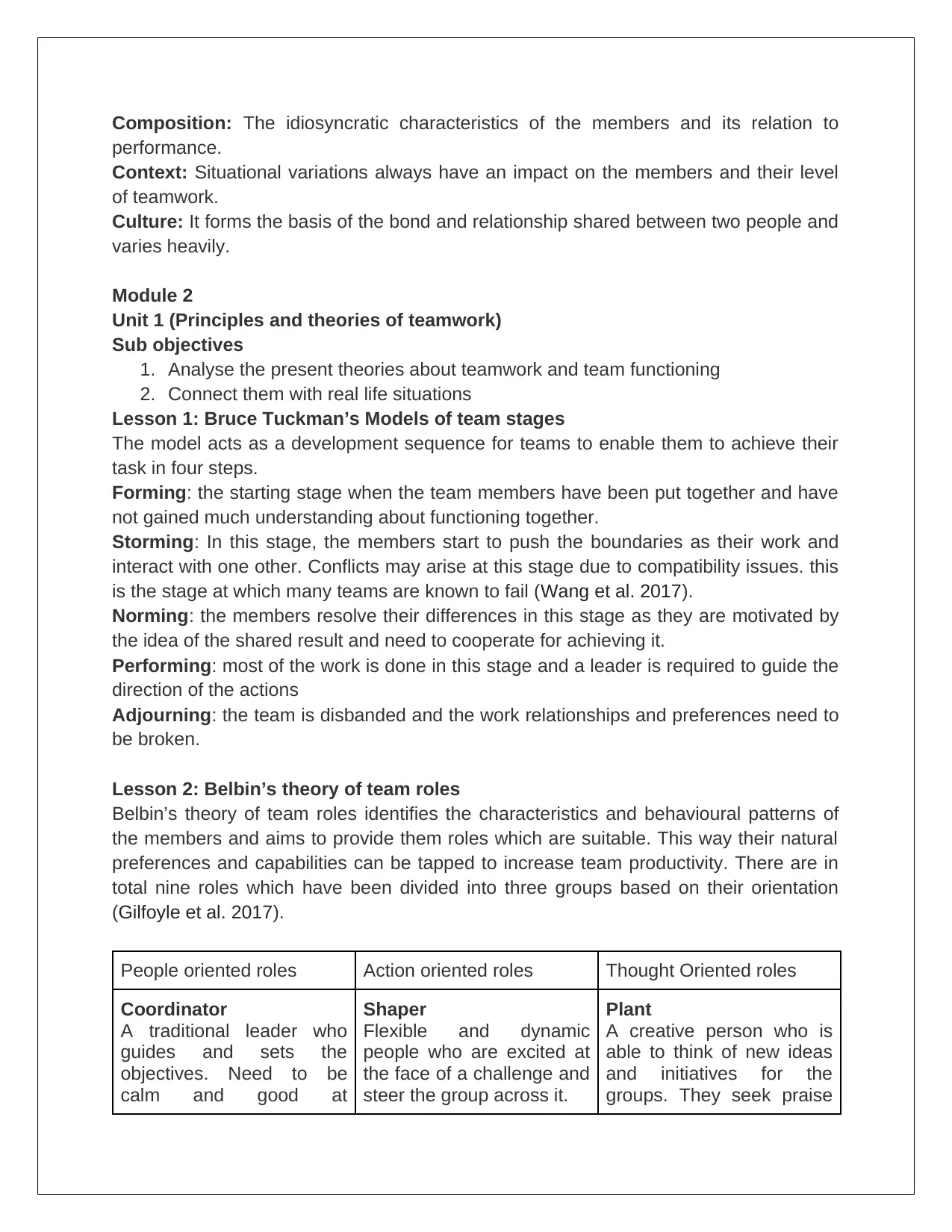
Composition: The idiosyncratic characteristics of the members and its relation to
performance.
Context: Situational variations always have an impact on the members and their level
of teamwork.
Culture: It forms the basis of the bond and relationship shared between two people and
varies heavily.
Module 2
Unit 1 (Principles and theories of teamwork)
Sub objectives
1. Analyse the present theories about teamwork and team functioning
2. Connect them with real life situations
Lesson 1: Bruce Tuckman’s Models of team stages
The model acts as a development sequence for teams to enable them to achieve their
task in four steps.
Forming: the starting stage when the team members have been put together and have
not gained much understanding about functioning together.
Storming: In this stage, the members start to push the boundaries as their work and
interact with one other. Conflicts may arise at this stage due to compatibility issues. this
is the stage at which many teams are known to fail (Wang et al. 2017).
Norming: the members resolve their differences in this stage as they are motivated by
the idea of the shared result and need to cooperate for achieving it.
Performing: most of the work is done in this stage and a leader is required to guide the
direction of the actions
Adjourning: the team is disbanded and the work relationships and preferences need to
be broken.
Lesson 2: Belbin’s theory of team roles
Belbin’s theory of team roles identifies the characteristics and behavioural patterns of
the members and aims to provide them roles which are suitable. This way their natural
preferences and capabilities can be tapped to increase team productivity. There are in
total nine roles which have been divided into three groups based on their orientation
(Gilfoyle et al. 2017).
People oriented roles Action oriented roles Thought Oriented roles
Coordinator
A traditional leader who
guides and sets the
objectives. Need to be
calm and good at
Shaper
Flexible and dynamic
people who are excited at
the face of a challenge and
steer the group across it.
Plant
A creative person who is
able to think of new ideas
and initiatives for the
groups. They seek praise
performance.
Context: Situational variations always have an impact on the members and their level
of teamwork.
Culture: It forms the basis of the bond and relationship shared between two people and
varies heavily.
Module 2
Unit 1 (Principles and theories of teamwork)
Sub objectives
1. Analyse the present theories about teamwork and team functioning
2. Connect them with real life situations
Lesson 1: Bruce Tuckman’s Models of team stages
The model acts as a development sequence for teams to enable them to achieve their
task in four steps.
Forming: the starting stage when the team members have been put together and have
not gained much understanding about functioning together.
Storming: In this stage, the members start to push the boundaries as their work and
interact with one other. Conflicts may arise at this stage due to compatibility issues. this
is the stage at which many teams are known to fail (Wang et al. 2017).
Norming: the members resolve their differences in this stage as they are motivated by
the idea of the shared result and need to cooperate for achieving it.
Performing: most of the work is done in this stage and a leader is required to guide the
direction of the actions
Adjourning: the team is disbanded and the work relationships and preferences need to
be broken.
Lesson 2: Belbin’s theory of team roles
Belbin’s theory of team roles identifies the characteristics and behavioural patterns of
the members and aims to provide them roles which are suitable. This way their natural
preferences and capabilities can be tapped to increase team productivity. There are in
total nine roles which have been divided into three groups based on their orientation
(Gilfoyle et al. 2017).
People oriented roles Action oriented roles Thought Oriented roles
Coordinator
A traditional leader who
guides and sets the
objectives. Need to be
calm and good at
Shaper
Flexible and dynamic
people who are excited at
the face of a challenge and
steer the group across it.
Plant
A creative person who is
able to think of new ideas
and initiatives for the
groups. They seek praise
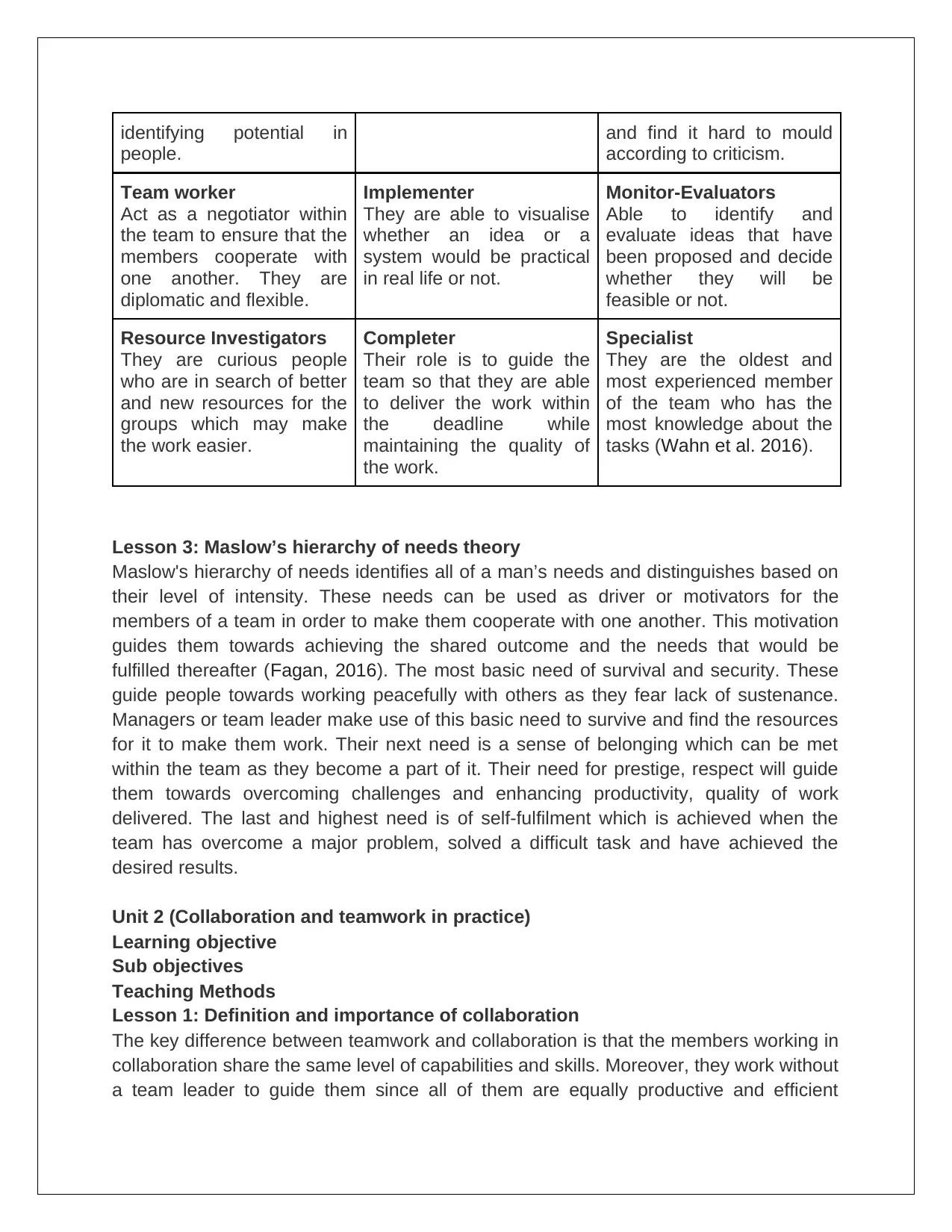
identifying potential in
people.
and find it hard to mould
according to criticism.
Team worker
Act as a negotiator within
the team to ensure that the
members cooperate with
one another. They are
diplomatic and flexible.
Implementer
They are able to visualise
whether an idea or a
system would be practical
in real life or not.
Monitor-Evaluators
Able to identify and
evaluate ideas that have
been proposed and decide
whether they will be
feasible or not.
Resource Investigators
They are curious people
who are in search of better
and new resources for the
groups which may make
the work easier.
Completer
Their role is to guide the
team so that they are able
to deliver the work within
the deadline while
maintaining the quality of
the work.
Specialist
They are the oldest and
most experienced member
of the team who has the
most knowledge about the
tasks (Wahn et al. 2016).
Lesson 3: Maslow’s hierarchy of needs theory
Maslow's hierarchy of needs identifies all of a man’s needs and distinguishes based on
their level of intensity. These needs can be used as driver or motivators for the
members of a team in order to make them cooperate with one another. This motivation
guides them towards achieving the shared outcome and the needs that would be
fulfilled thereafter (Fagan, 2016). The most basic need of survival and security. These
guide people towards working peacefully with others as they fear lack of sustenance.
Managers or team leader make use of this basic need to survive and find the resources
for it to make them work. Their next need is a sense of belonging which can be met
within the team as they become a part of it. Their need for prestige, respect will guide
them towards overcoming challenges and enhancing productivity, quality of work
delivered. The last and highest need is of self-fulfilment which is achieved when the
team has overcome a major problem, solved a difficult task and have achieved the
desired results.
Unit 2 (Collaboration and teamwork in practice)
Learning objective
Sub objectives
Teaching Methods
Lesson 1: Definition and importance of collaboration
The key difference between teamwork and collaboration is that the members working in
collaboration share the same level of capabilities and skills. Moreover, they work without
a team leader to guide them since all of them are equally productive and efficient
people.
and find it hard to mould
according to criticism.
Team worker
Act as a negotiator within
the team to ensure that the
members cooperate with
one another. They are
diplomatic and flexible.
Implementer
They are able to visualise
whether an idea or a
system would be practical
in real life or not.
Monitor-Evaluators
Able to identify and
evaluate ideas that have
been proposed and decide
whether they will be
feasible or not.
Resource Investigators
They are curious people
who are in search of better
and new resources for the
groups which may make
the work easier.
Completer
Their role is to guide the
team so that they are able
to deliver the work within
the deadline while
maintaining the quality of
the work.
Specialist
They are the oldest and
most experienced member
of the team who has the
most knowledge about the
tasks (Wahn et al. 2016).
Lesson 3: Maslow’s hierarchy of needs theory
Maslow's hierarchy of needs identifies all of a man’s needs and distinguishes based on
their level of intensity. These needs can be used as driver or motivators for the
members of a team in order to make them cooperate with one another. This motivation
guides them towards achieving the shared outcome and the needs that would be
fulfilled thereafter (Fagan, 2016). The most basic need of survival and security. These
guide people towards working peacefully with others as they fear lack of sustenance.
Managers or team leader make use of this basic need to survive and find the resources
for it to make them work. Their next need is a sense of belonging which can be met
within the team as they become a part of it. Their need for prestige, respect will guide
them towards overcoming challenges and enhancing productivity, quality of work
delivered. The last and highest need is of self-fulfilment which is achieved when the
team has overcome a major problem, solved a difficult task and have achieved the
desired results.
Unit 2 (Collaboration and teamwork in practice)
Learning objective
Sub objectives
Teaching Methods
Lesson 1: Definition and importance of collaboration
The key difference between teamwork and collaboration is that the members working in
collaboration share the same level of capabilities and skills. Moreover, they work without
a team leader to guide them since all of them are equally productive and efficient
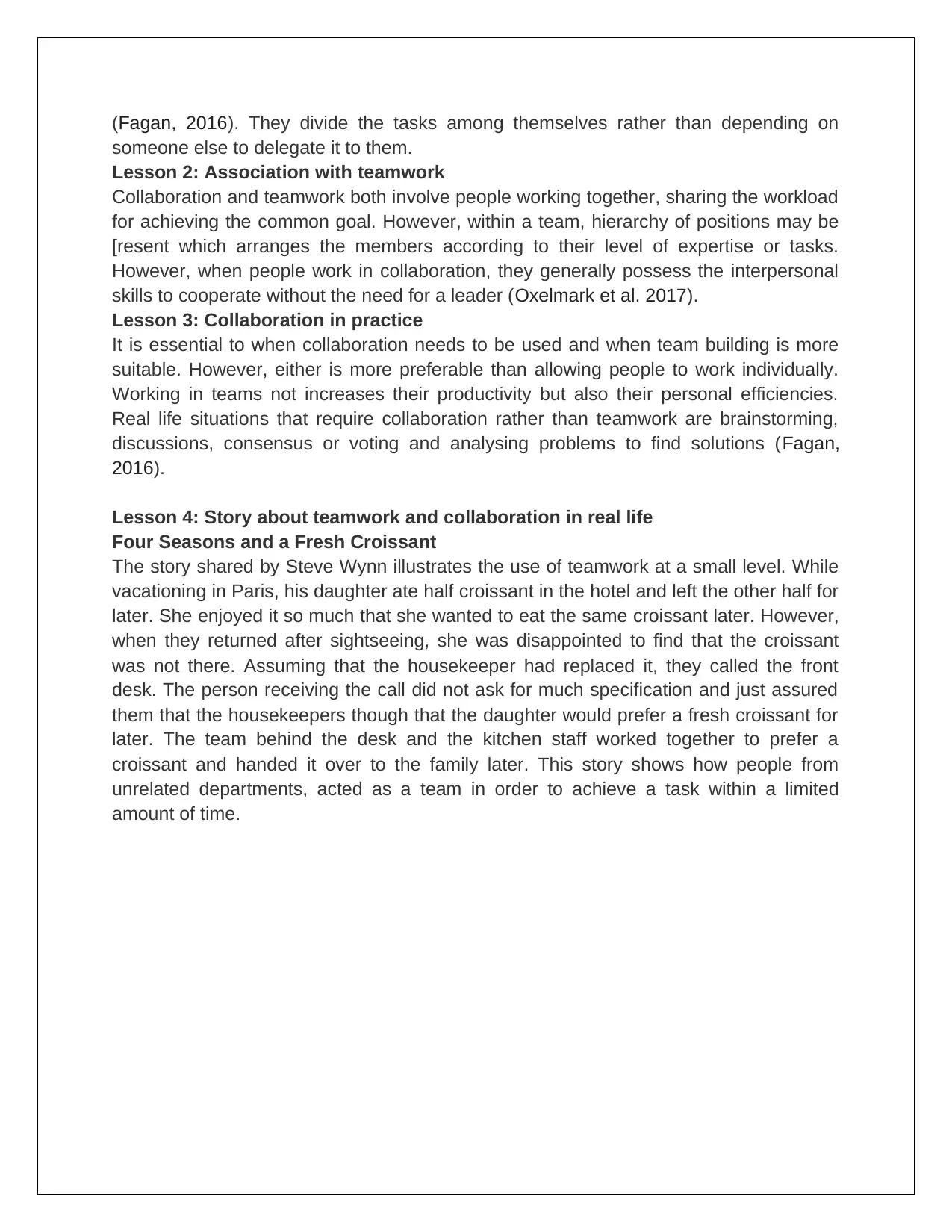
(Fagan, 2016). They divide the tasks among themselves rather than depending on
someone else to delegate it to them.
Lesson 2: Association with teamwork
Collaboration and teamwork both involve people working together, sharing the workload
for achieving the common goal. However, within a team, hierarchy of positions may be
[resent which arranges the members according to their level of expertise or tasks.
However, when people work in collaboration, they generally possess the interpersonal
skills to cooperate without the need for a leader (Oxelmark et al. 2017).
Lesson 3: Collaboration in practice
It is essential to when collaboration needs to be used and when team building is more
suitable. However, either is more preferable than allowing people to work individually.
Working in teams not increases their productivity but also their personal efficiencies.
Real life situations that require collaboration rather than teamwork are brainstorming,
discussions, consensus or voting and analysing problems to find solutions (Fagan,
2016).
Lesson 4: Story about teamwork and collaboration in real life
Four Seasons and a Fresh Croissant
The story shared by Steve Wynn illustrates the use of teamwork at a small level. While
vacationing in Paris, his daughter ate half croissant in the hotel and left the other half for
later. She enjoyed it so much that she wanted to eat the same croissant later. However,
when they returned after sightseeing, she was disappointed to find that the croissant
was not there. Assuming that the housekeeper had replaced it, they called the front
desk. The person receiving the call did not ask for much specification and just assured
them that the housekeepers though that the daughter would prefer a fresh croissant for
later. The team behind the desk and the kitchen staff worked together to prefer a
croissant and handed it over to the family later. This story shows how people from
unrelated departments, acted as a team in order to achieve a task within a limited
amount of time.
someone else to delegate it to them.
Lesson 2: Association with teamwork
Collaboration and teamwork both involve people working together, sharing the workload
for achieving the common goal. However, within a team, hierarchy of positions may be
[resent which arranges the members according to their level of expertise or tasks.
However, when people work in collaboration, they generally possess the interpersonal
skills to cooperate without the need for a leader (Oxelmark et al. 2017).
Lesson 3: Collaboration in practice
It is essential to when collaboration needs to be used and when team building is more
suitable. However, either is more preferable than allowing people to work individually.
Working in teams not increases their productivity but also their personal efficiencies.
Real life situations that require collaboration rather than teamwork are brainstorming,
discussions, consensus or voting and analysing problems to find solutions (Fagan,
2016).
Lesson 4: Story about teamwork and collaboration in real life
Four Seasons and a Fresh Croissant
The story shared by Steve Wynn illustrates the use of teamwork at a small level. While
vacationing in Paris, his daughter ate half croissant in the hotel and left the other half for
later. She enjoyed it so much that she wanted to eat the same croissant later. However,
when they returned after sightseeing, she was disappointed to find that the croissant
was not there. Assuming that the housekeeper had replaced it, they called the front
desk. The person receiving the call did not ask for much specification and just assured
them that the housekeepers though that the daughter would prefer a fresh croissant for
later. The team behind the desk and the kitchen staff worked together to prefer a
croissant and handed it over to the family later. This story shows how people from
unrelated departments, acted as a team in order to achieve a task within a limited
amount of time.
Paraphrase This Document
Need a fresh take? Get an instant paraphrase of this document with our AI Paraphraser
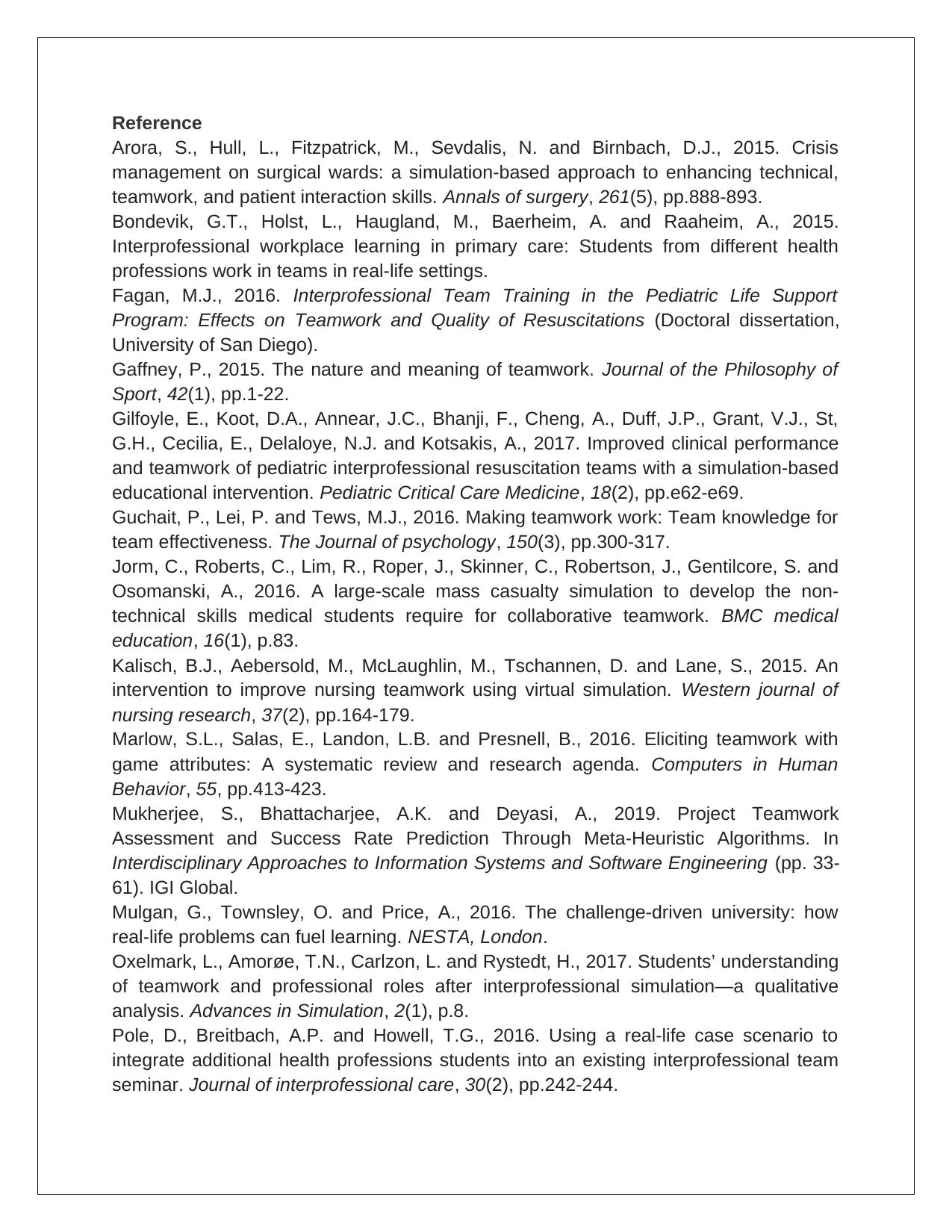
Reference
Arora, S., Hull, L., Fitzpatrick, M., Sevdalis, N. and Birnbach, D.J., 2015. Crisis
management on surgical wards: a simulation-based approach to enhancing technical,
teamwork, and patient interaction skills. Annals of surgery, 261(5), pp.888-893.
Bondevik, G.T., Holst, L., Haugland, M., Baerheim, A. and Raaheim, A., 2015.
Interprofessional workplace learning in primary care: Students from different health
professions work in teams in real-life settings.
Fagan, M.J., 2016. Interprofessional Team Training in the Pediatric Life Support
Program: Effects on Teamwork and Quality of Resuscitations (Doctoral dissertation,
University of San Diego).
Gaffney, P., 2015. The nature and meaning of teamwork. Journal of the Philosophy of
Sport, 42(1), pp.1-22.
Gilfoyle, E., Koot, D.A., Annear, J.C., Bhanji, F., Cheng, A., Duff, J.P., Grant, V.J., St,
G.H., Cecilia, E., Delaloye, N.J. and Kotsakis, A., 2017. Improved clinical performance
and teamwork of pediatric interprofessional resuscitation teams with a simulation-based
educational intervention. Pediatric Critical Care Medicine, 18(2), pp.e62-e69.
Guchait, P., Lei, P. and Tews, M.J., 2016. Making teamwork work: Team knowledge for
team effectiveness. The Journal of psychology, 150(3), pp.300-317.
Jorm, C., Roberts, C., Lim, R., Roper, J., Skinner, C., Robertson, J., Gentilcore, S. and
Osomanski, A., 2016. A large-scale mass casualty simulation to develop the non-
technical skills medical students require for collaborative teamwork. BMC medical
education, 16(1), p.83.
Kalisch, B.J., Aebersold, M., McLaughlin, M., Tschannen, D. and Lane, S., 2015. An
intervention to improve nursing teamwork using virtual simulation. Western journal of
nursing research, 37(2), pp.164-179.
Marlow, S.L., Salas, E., Landon, L.B. and Presnell, B., 2016. Eliciting teamwork with
game attributes: A systematic review and research agenda. Computers in Human
Behavior, 55, pp.413-423.
Mukherjee, S., Bhattacharjee, A.K. and Deyasi, A., 2019. Project Teamwork
Assessment and Success Rate Prediction Through Meta-Heuristic Algorithms. In
Interdisciplinary Approaches to Information Systems and Software Engineering (pp. 33-
61). IGI Global.
Mulgan, G., Townsley, O. and Price, A., 2016. The challenge-driven university: how
real-life problems can fuel learning. NESTA, London.
Oxelmark, L., Amorøe, T.N., Carlzon, L. and Rystedt, H., 2017. Students’ understanding
of teamwork and professional roles after interprofessional simulation—a qualitative
analysis. Advances in Simulation, 2(1), p.8.
Pole, D., Breitbach, A.P. and Howell, T.G., 2016. Using a real-life case scenario to
integrate additional health professions students into an existing interprofessional team
seminar. Journal of interprofessional care, 30(2), pp.242-244.
Arora, S., Hull, L., Fitzpatrick, M., Sevdalis, N. and Birnbach, D.J., 2015. Crisis
management on surgical wards: a simulation-based approach to enhancing technical,
teamwork, and patient interaction skills. Annals of surgery, 261(5), pp.888-893.
Bondevik, G.T., Holst, L., Haugland, M., Baerheim, A. and Raaheim, A., 2015.
Interprofessional workplace learning in primary care: Students from different health
professions work in teams in real-life settings.
Fagan, M.J., 2016. Interprofessional Team Training in the Pediatric Life Support
Program: Effects on Teamwork and Quality of Resuscitations (Doctoral dissertation,
University of San Diego).
Gaffney, P., 2015. The nature and meaning of teamwork. Journal of the Philosophy of
Sport, 42(1), pp.1-22.
Gilfoyle, E., Koot, D.A., Annear, J.C., Bhanji, F., Cheng, A., Duff, J.P., Grant, V.J., St,
G.H., Cecilia, E., Delaloye, N.J. and Kotsakis, A., 2017. Improved clinical performance
and teamwork of pediatric interprofessional resuscitation teams with a simulation-based
educational intervention. Pediatric Critical Care Medicine, 18(2), pp.e62-e69.
Guchait, P., Lei, P. and Tews, M.J., 2016. Making teamwork work: Team knowledge for
team effectiveness. The Journal of psychology, 150(3), pp.300-317.
Jorm, C., Roberts, C., Lim, R., Roper, J., Skinner, C., Robertson, J., Gentilcore, S. and
Osomanski, A., 2016. A large-scale mass casualty simulation to develop the non-
technical skills medical students require for collaborative teamwork. BMC medical
education, 16(1), p.83.
Kalisch, B.J., Aebersold, M., McLaughlin, M., Tschannen, D. and Lane, S., 2015. An
intervention to improve nursing teamwork using virtual simulation. Western journal of
nursing research, 37(2), pp.164-179.
Marlow, S.L., Salas, E., Landon, L.B. and Presnell, B., 2016. Eliciting teamwork with
game attributes: A systematic review and research agenda. Computers in Human
Behavior, 55, pp.413-423.
Mukherjee, S., Bhattacharjee, A.K. and Deyasi, A., 2019. Project Teamwork
Assessment and Success Rate Prediction Through Meta-Heuristic Algorithms. In
Interdisciplinary Approaches to Information Systems and Software Engineering (pp. 33-
61). IGI Global.
Mulgan, G., Townsley, O. and Price, A., 2016. The challenge-driven university: how
real-life problems can fuel learning. NESTA, London.
Oxelmark, L., Amorøe, T.N., Carlzon, L. and Rystedt, H., 2017. Students’ understanding
of teamwork and professional roles after interprofessional simulation—a qualitative
analysis. Advances in Simulation, 2(1), p.8.
Pole, D., Breitbach, A.P. and Howell, T.G., 2016. Using a real-life case scenario to
integrate additional health professions students into an existing interprofessional team
seminar. Journal of interprofessional care, 30(2), pp.242-244.
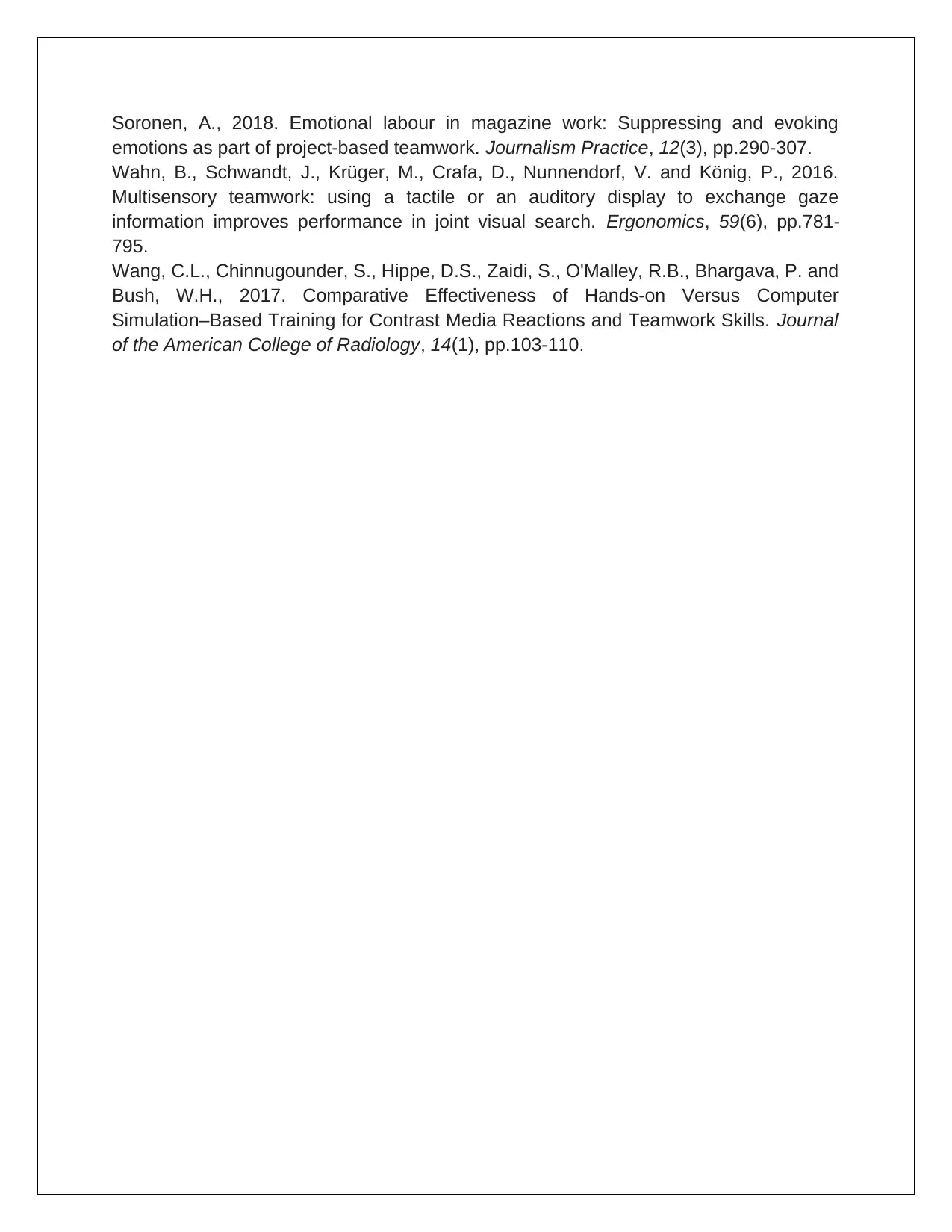
Soronen, A., 2018. Emotional labour in magazine work: Suppressing and evoking
emotions as part of project-based teamwork. Journalism Practice, 12(3), pp.290-307.
Wahn, B., Schwandt, J., Krüger, M., Crafa, D., Nunnendorf, V. and König, P., 2016.
Multisensory teamwork: using a tactile or an auditory display to exchange gaze
information improves performance in joint visual search. Ergonomics, 59(6), pp.781-
795.
Wang, C.L., Chinnugounder, S., Hippe, D.S., Zaidi, S., O'Malley, R.B., Bhargava, P. and
Bush, W.H., 2017. Comparative Effectiveness of Hands-on Versus Computer
Simulation–Based Training for Contrast Media Reactions and Teamwork Skills. Journal
of the American College of Radiology, 14(1), pp.103-110.
emotions as part of project-based teamwork. Journalism Practice, 12(3), pp.290-307.
Wahn, B., Schwandt, J., Krüger, M., Crafa, D., Nunnendorf, V. and König, P., 2016.
Multisensory teamwork: using a tactile or an auditory display to exchange gaze
information improves performance in joint visual search. Ergonomics, 59(6), pp.781-
795.
Wang, C.L., Chinnugounder, S., Hippe, D.S., Zaidi, S., O'Malley, R.B., Bhargava, P. and
Bush, W.H., 2017. Comparative Effectiveness of Hands-on Versus Computer
Simulation–Based Training for Contrast Media Reactions and Teamwork Skills. Journal
of the American College of Radiology, 14(1), pp.103-110.
1 out of 9
Your All-in-One AI-Powered Toolkit for Academic Success.
+13062052269
info@desklib.com
Available 24*7 on WhatsApp / Email
![[object Object]](/_next/static/media/star-bottom.7253800d.svg)
Unlock your academic potential
© 2024 | Zucol Services PVT LTD | All rights reserved.





